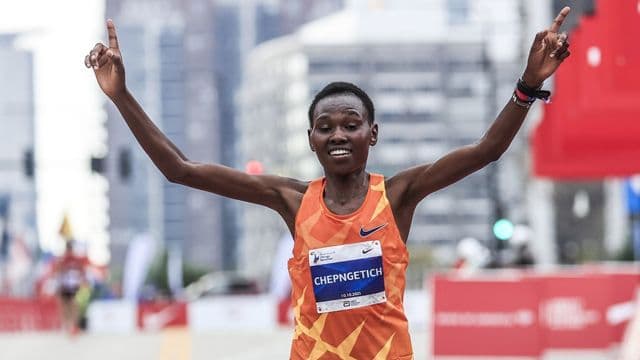World Record Shattered by Scandal: Marathon Queen Ruth Chepngetich's Shocking Doping Revelation

The Unthinkable Fall of a Marathon Legend
The athletics world was left in complete shock when news broke on July 18, 2025, that Ruth Chepngetich, the woman who made history by becoming the first female marathoner to break the 2:10:00 barrier, had tested positive for banned substances. The 31-year-old Kenyan superstar, who captivated global audiences with her phenomenal 2:09:56 world record at the 2024 Chicago Marathon, now finds herself at the center of one of the sport's most devastating doping scandals.
The Athletics Integrity Unit (AIU), World Athletics' independent body, officially announced that Chepngetich's urine sample collected on March 14, 2025, contained traces of hydrochlorothiazide (HCTZ), a banned diuretic. What makes this case particularly alarming is the concentration level found in her system - a staggering 3,800ng/mL, which is 190 times higher than the World Anti-Doping Agency's permitted threshold of 20ng/mL. This isn't a case of accidental ingestion or contamination; these numbers suggest deliberate and systematic use of prohibited substances.
Breaking Down the Science Behind the Scandal

HCTZ, the substance that ended Chepngetich's career trajectory, is classified as an S5-category prohibited drug by WADA, falling under the diuretics and masking agents category. While medically prescribed for treating fluid retention and hypertension, HCTZ serves a much more sinister purpose in competitive sports. Athletes often use this diuretic not just for its performance-enhancing properties, but as a masking agent to rapidly flush other banned substances from their system before testing.
The detection of such astronomical levels in Chepngetich's sample raises serious questions about the duration and intensity of her alleged doping program. Sports medicine experts suggest that achieving 3,800ng/mL concentration would require sustained and systematic use of the substance, making claims of accidental ingestion virtually impossible to substantiate. This revelation has cast a dark shadow over her historic Chicago Marathon performance, where she shattered Tigist Assefa's previous world record of 2:11:53 by nearly two full minutes.
The Timeline of Deception: From Glory to Disgrace
The chronology of events reveals a carefully orchestrated attempt to manage the crisis. The positive test result from March 14 reached the AIU on April 3, 2025. By April 16, officials conducted a face-to-face meeting with Chepngetich in Kenya, where she reportedly agreed to cooperate fully with the investigation. Just three days later, on April 19, she voluntarily withdrew from competition pending the conclusion of the investigation.
This timeline suggests Chepngetich and her team were aware of the severity of the situation months before the public announcement. The voluntary withdrawal, while appearing cooperative, also prevented her from competing in major 2025 marathons where she might have faced additional testing. The AIU's decision to formally impose the provisional suspension on July 18, 2025, marked the official end of her competitive career as we knew it, with potential sanctions including a two-year ban from the sport.
Global Athletics Community Reacts with Disbelief
The international running community's response has been a mixture of devastation and vindication. Many elite marathoners had privately questioned the legitimacy of Chepngetich's Chicago performance, particularly given the magnitude of her improvement and the significant gap she created with the previous world record. Social media platforms erupted with discussions about the integrity of women's marathon records, with some calling for a comprehensive review of recent performances.
Interestingly, the scandal recalls a moment from Chepngetich's record-breaking race when a journalist asked about potential suspicions regarding her performance. Her response - that she had never considered such questions - now appears tragically ironic. Several Kenyan parliamentarians had defended her at the time, criticizing the journalist's inquiry as unprofessional and baseless. These same officials now find themselves in the awkward position of having vouched for an athlete whose achievements may have been artificially enhanced.
The Broader Implications for Kenyan Athletics
Chepngetich's downfall represents more than just an individual tragedy; it's a significant blow to Kenya's reputation as the world's distance running powerhouse. The East African nation has long prided itself on producing naturally gifted endurance athletes, with their success attributed to high-altitude training, genetic predisposition, and a rich running culture. This scandal threatens to undermine that narrative and raises uncomfortable questions about the prevalence of doping within Kenyan athletics programs.
The timing couldn't be worse for Kenyan athletics officials, who have been working to restore confidence following previous doping controversies involving other prominent athletes. The revelation that their most celebrated recent achievement may have been chemically assisted deals a devastating blow to the country's sporting credibility and could impact funding, sponsorship deals, and international participation opportunities for clean Kenyan athletes.
What Lies Ahead: Sanctions and Consequences
The AIU has indicated that while they typically impose two-year suspensions for HCTZ violations, the final penalty could be adjusted based on various factors. Given the extreme concentration levels found in Chepngetich's system and the high-profile nature of her case, there's speculation that she could face an extended ban. The potential consequences extend far beyond the suspension period - her world record achievement is now under scrutiny and could be stripped, prize money may need to be returned, and her legacy will forever be tainted.
The case also highlights the ongoing challenges in anti-doping enforcement, particularly the sophisticated methods athletes and their support networks employ to circumvent testing protocols. While Chepngetich's eventual capture demonstrates that the system works, it also raises questions about how many other athletes might be successfully evading detection. As the athletics world grapples with this latest scandal, the focus must remain on protecting clean athletes and preserving the integrity of the sport that has inspired millions worldwide.
Discover More

SHOCK: Real Madrid Considers Selling Vinicius Jr if He Refuses to Lower Salary Demands
Real Madrid is reportedly considering selling Brazilian superstar Vinicius Jr after contract negotiations stalled over his €30 million annual salary demands, with Saudi clubs preparing record-breaking bids.

"I Can't Take It Anymore" - Chengdu Coach Seo Jeong-won's Public Outcry Against Management Sparks Chinese Football Drama
Korean coach Seo Jeong-won's explosive press conference reveals deep conflicts with Chengdu Rongcheng management, exposing power struggles that threaten the team's success despite their historic rise from second division to Asian Champions League contenders.